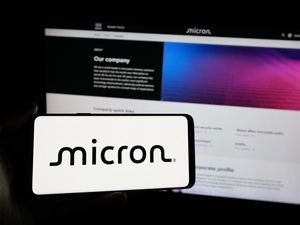
As of October 2025, the manufacturing sector presents a complex yet largely optimistic landscape, characterized by significant digital transformation and strategic reshoring efforts. Amidst this evolving environment, Taiwan Semiconductor Manufacturing Company (NYSE: TSM) stands out as an undeniable linchpin, not just within its industry but as an indispensable architect of the global artificial intelligence (AI) boom. The company's immediate significance is profoundly tied to its unparalleled dominance in advanced chip fabrication, a capability that underpins nearly every major AI advancement and dictates the pace of technological innovation worldwide.
TSM's robust financial performance and optimistic growth projections reflect its critical role. The company recently reported extraordinary Q3 2025 results, exceeding market expectations with a 40.1% year-over-year revenue increase and a diluted EPS of $2.92. This momentum is projected to continue, with anticipated Q4 2025 revenues between $32.2 billion and $33.4 billion, signaling a 22% year-over-year rise. Analysts are bullish, with a consensus average price target suggesting a substantial upside, underscoring TSM's perceived value and its pivotal position in a market increasingly driven by the insatiable demand for AI.
The Unseen Architect: TSM's Technical Prowess and Market Dominance
Taiwan Semiconductor Manufacturing Company (NYSE: TSM) stands as the preeminent force in the semiconductor foundry industry as of October 2025, underpinning the explosive growth of artificial intelligence (AI) with its cutting-edge process technologies and advanced packaging solutions. The company's unique pure-play foundry model and relentless innovation have solidified its indispensable role in the global technology landscape.
AI Advancement Contributions
TSMC is widely recognized as the fundamental enabler for virtually all significant AI advancements, from sophisticated large language models to complex autonomous systems. Its advanced manufacturing capabilities are critical for producing the high-performance, power-efficient AI accelerators that drive modern AI workloads. TSMC's technology is paving the way for a new generation of AI chips capable of handling more intricate models with reduced energy consumption, crucial for both data centers and edge devices. This includes real-time AI inference engines for fully autonomous vehicles, advanced augmented and virtual reality devices, and highly nuanced personal AI assistants.
High-Performance Computing (HPC), which encompasses AI applications, constituted a significant 57% of TSMC's Q3 2025 revenue. AI processors and related infrastructure sales collectively account for nearly two-thirds of the company's total revenue, highlighting its central role in the AI revolution's hardware backbone. To meet surging AI demand, TSMC projects its AI product wafer shipments in 2025 to be 12 times those in 2021. The company is aggressively expanding its advanced packaging capacity, particularly for CoWoS (Chip-on-Wafer-on-Substrate), aiming to quadruple output by the end of 2025 and reach 130,000 wafers per month by 2026. TSMC's 3D stacking technology, SoIC (System-on-Integrated-Chips), is also slated for mass production in 2025 to facilitate ultra-high bandwidth for HPC applications. Major AI industry players such as NVIDIA (NASDAQ: NVDA), Advanced Micro Devices (NASDAQ: AMD), Alphabet (NASDAQ: GOOGL), Amazon (NASDAQ: AMZN), and OpenAI rely almost exclusively on TSMC to manufacture their advanced AI chips, with many designing their next-generation accelerators on TSMC's latest process nodes. Apple (NASDAQ: AAPL) is also anticipated to be an early adopter of the upcoming 2nm process.
Technical Specifications of Leading-Edge Processes
TSMC continues to push the boundaries of semiconductor manufacturing with an aggressive roadmap for smaller geometries and enhanced performance. Its 5nm process (N5 Family), introduced in volume production in 2020, delivers a 1.8x increase in transistor density and a 15% speed improvement compared to its 7nm predecessor. In Q3 2025, the 5nm node remained a substantial contributor, accounting for 37% of TSMC's wafer revenue, reflecting strong ongoing demand from major tech companies.
TSMC pioneered high-volume production of its 3nm FinFET (N3) technology in 2022. This node represents a full-node advancement over 5nm, offering a 1.6x increase in logic transistor density and a 25-30% reduction in power consumption at the same speed, or a 10-15% performance boost at the same power. The 3nm process contributed 23% to TSMC's wafer revenue in Q3 2025, indicating rapid adoption. The N3 Enhanced (N3E) process is in high-volume production for mobile and HPC/AI, offering better yields, while N3P, which entered volume production in late 2024, is slated to succeed N3E with further power, performance, and density improvements. TSMC is extending the 3nm family with specialized variants like N3X for high-performance computing, N3A for automotive applications, and N3C for cost-effective products.
The 2nm (N2) technology marks a pivotal transition for TSMC, moving from FinFET to Gate-All-Around (GAA) nanosheet transistors. Mass production for N2 is anticipated in the fourth quarter or latter half of 2025, ahead of earlier projections. N2 is expected to deliver a significant 15% performance increase at the same power, or a 25-30% power reduction at the same speed, compared to the 3nm node. It also promises a 1.15x increase in transistor density. An enhanced N2P node is scheduled for mass production in the second half of 2026, with N2X offering an additional ~10% Fmax for 2027. Beyond 2nm, the A16 (1.6nm-class) technology, slated for mass production in late 2026, will integrate nanosheet transistors with an innovative Super Power Rail (SPR) solution for enhanced logic density and power delivery, particularly beneficial for datacenter-grade AI processors. It is expected to offer an 8-10% speed improvement at the same power or a 15-20% power reduction at the same speed compared to N2P. TSMC's roadmap extends to A14 technology by 2028, featuring second-generation nanosheet transistors and continuous pitch scaling, with development progress reportedly ahead of schedule.
TSM's Approach vs. Competitors (Intel, Samsung Foundry)
TSMC maintains a commanding lead over its rivals, Intel (NASDAQ: INTC) and Samsung Foundry (KRX: 005930), primarily due to its dedicated pure-play foundry model and consistent technological execution with superior yields. Unlike Integrated Device Manufacturers (IDMs) like Intel and Samsung, which design and manufacture their own chips, TSMC operates solely as a foundry. This model prevents internal competition with its diverse customer base and fosters strong, long-term partnerships with leading chip designers.
TSMC holds an estimated 70.2% to 71% market share in the global pure-play wafer foundry market as of Q2 2025, a dominance that intensifies in the advanced AI chip segment. While Samsung and Intel are pursuing advanced nodes, TSMC generally requires over an 80% yield rate before commencing formal operations at its 3nm and 2nm processes, whereas competitors may start with lower yields (around 60%), often leveraging their own product lines to offset losses. This focus on stable, high yields makes TSMC the preferred choice for external customers prioritizing consistent quality and supply.
Samsung launched its 3nm Gate-All-Around (GAA) process in mid-2022, but TSMC's 3nm (N3) FinFET technology has shown good yields. Samsung's 2nm process is expected to enter mass production in 2025, but its reported yield rate for 2nm is approximately 40% as of mid-2025, compared to TSMC's ~60%. Samsung is reportedly engaging in aggressive pricing, with its 2nm wafers priced at $20,000, a 33% reduction from TSMC's estimated $30,000. Intel's 18A process, comparable to TSMC's 2nm, is scheduled for mass production in the second half of 2025. While Intel claims its 18A node was the first 2nm-class node to achieve high-volume manufacturing, its reported yields for 18A were around 10% by summer 2025, figures Intel disputes. Intel's strategy involves customer-commitment driven capacity, with wafer commitments beginning in 2026. Its upcoming 20A process will feature RibbonFET (GAA) transistors and PowerVia backside power delivery, innovations that could provide a competitive edge if execution and yield rates prove successful.
Initial Reactions from the AI Research Community and Industry Experts
The AI research community and industry experts consistently acknowledge TSMC's paramount technological leadership and its pivotal role in the ongoing AI revolution. Analysts frequently refer to TSMC as the "indispensable architect of the AI supercycle," citing its market dominance and relentless technological advancements. Its ability to deliver high-volume, high-performance chips makes it the essential manufacturing partner for leading AI companies.
TSMC's record-breaking Q3 2025 financial results, with revenue reaching $33.1 billion and a 39% year-over-year profit surge, are seen as strong validation of the "AI supercycle" and TSMC's central position within it. The company has even raised its 2025 revenue growth forecast to the mid-30% range, driven by stronger-than-expected AI chip demand. Experts emphasize that in the current AI era, hardware has become a "strategic differentiator," a shift fundamentally enabled by TSMC's manufacturing prowess, distinguishing it from previous eras focused primarily on algorithmic advancements.
Despite aggressive expansion in advanced packaging like CoWoS, the overwhelming demand for AI chips continues to outstrip supply, leading to persistent capacity constraints. Geopolitical risks associated with Taiwan also remain a significant concern due to the high concentration of advanced chip manufacturing. TSMC is addressing this by diversifying its manufacturing footprint, with substantial investments in facilities in Arizona and Japan. Industry analysts and investors generally maintain a highly optimistic outlook for TSM. Many view the stock as undervalued given its growth potential and critical market position, projecting its AI accelerator revenue to double in 2025 and achieve a mid-40% CAGR from 2024 to 2029. Some analysts have raised price targets, citing TSM's pricing power and leadership in 2nm technology.
Corporate Beneficiaries and Competitive Dynamics in the AI Era
Taiwan Semiconductor Manufacturing Company (NYSE: TSM) holds an unparalleled and indispensable position in the global technology landscape as of October 2025, particularly within the booming Artificial Intelligence (AI) sector. Its technological leadership and dominant market share profoundly influence AI companies, tech giants, and startups alike, shaping product development, market positioning, and strategic advantages in the AI hardware space.
TSM's Current Market Position and Technological Leadership
TSM is the world's largest dedicated contract chip manufacturer, boasting a dominant market share of approximately 71% in the chip foundry market in Q2 2025, and an even more pronounced 92% in advanced AI chip manufacturing. The company's financial performance reflects this strength, with Q3 2025 revenue reaching $33.1 billion, a 41% year-over-year increase, and net profit soaring by 39% to $14.75 billion. TSM has raised its 2025 revenue growth forecast to the mid-30% range, citing strong confidence in AI-driven demand.
TSM's technological leadership is centered on its cutting-edge process nodes and advanced packaging solutions, which are critical for the next generation of AI processors. As of October 2025, TSM is at the forefront with its 3-nanometer (3nm) technology, which accounted for 23% of its wafer revenue in Q3 2025, and is aggressively advancing towards 2-nanometer (2nm), A16 (1.6nm-class), and A14 (1.4nm) processes. The 2nm process is slated for mass production in the second half of 2025, utilizing Gate-All-Around (GAA) nanosheet transistors, which promise a 15% performance improvement or a 25-30% reduction in power consumption compared to 3nm. TSM is also on track for 1.6nm (A16) nodes by 2026 and 1.4nm (A14) by 2028. Furthermore, TSM's innovative packaging solutions like CoWoS (Chip-on-Wafer-on-Substrate) and SoIC (System-on-Integrated-Chips) are vital for integrating multiple dies and High-Bandwidth Memory (HBM) into powerful AI accelerators. The company is quadrupling its CoWoS capacity by the end of 2025 and plans for mass production of SoIC (3D stacking) in 2025. TSM's strategic global expansion, including fabs in Arizona, Japan, and Germany, aims to mitigate geopolitical risks and ensure supply chain resilience, although it comes with potential margin pressures due to higher overseas production costs.
Impact on Other AI Companies, Tech Giants, and Startups
TSM's market position and technological leadership create a foundational dependency for virtually all advanced AI developments. The "AI Supercycle" is driven by an insatiable demand for computational power, and TSM is the "unseen architect" enabling this revolution. AI companies and tech giants are highly reliant on TSM for manufacturing their cutting-edge AI chips, including GPUs and custom ASICs. TSM's ability to produce smaller, faster, and more energy-efficient chips directly impacts the performance and cost-efficiency of AI products. Innovative AI chip startups must secure allocation with TSM, often competing with tech giants for limited advanced node capacity. TSM's willingness to collaborate with startups like Tesla (NASDAQ: TSLA) and Cerebras provides them a competitive edge by offering early experience in producing cutting-edge AI chips.
Companies Standing to Benefit Most from TSM's Developments
The companies that stand to benefit most are those at the forefront of AI chip design and cloud infrastructure, deeply integrated into TSM's manufacturing pipeline:
- NVIDIA (NASDAQ: NVDA): As the undisputed leader in AI GPUs, commanding an estimated 80-85% market share, NVIDIA is a primary beneficiary and directly dependent on TSM for manufacturing its high-powered AI chips, including the H100, Blackwell, and upcoming Rubin GPUs. NVIDIA's Blackwell AI GPUs are already rolling out from TSM's Phoenix plant. TSM's CoWoS capacity expansion directly supports NVIDIA's demand for complex AI chips.
- Advanced Micro Devices (NASDAQ: AMD): A strong competitor to NVIDIA, AMD utilizes TSM's advanced packaging and leading-edge nodes for its next-generation data center GPUs (MI300 series) and other AI-powered chips. AMD is a key driver of demand for TSM's 4nm and 5nm chips.
- Apple (NASDAQ: AAPL): Apple is a leading customer for TSM's 3nm production, driving its ramp-up, and is anticipated to be an early adopter of TSM's 2nm technology for its premium smartphones and on-device AI.
- Hyperscale Cloud Providers (Alphabet (NASDAQ: GOOGL), Amazon (NASDAQ: AMZN), Microsoft (NASDAQ: MSFT), Meta Platforms (NASDAQ: META)): These tech giants design custom AI silicon (e.g., Google's TPUs, Amazon Web Services' Trainium chips, Meta Platform's MTIA accelerators) and rely heavily on TSM for manufacturing these advanced chips to power their vast AI infrastructures and offerings. Google, Amazon, and OpenAI are designing their next-generation AI accelerators and custom AI chips on TSM's advanced 2nm node.
Competitive Implications for Major AI Labs and Tech Companies
TSM's dominance creates a complex competitive landscape:
- NVIDIA: TSM's manufacturing prowess, coupled with NVIDIA's strong CUDA ecosystem, allows NVIDIA to maintain its leadership in the AI hardware market, creating a high barrier to entry for competitors. The close partnership ensures NVIDIA can bring its cutting-edge designs to market efficiently.
- AMD: While AMD is making significant strides in AI chips, its success is intrinsically linked to TSM's ability to provide advanced manufacturing and packaging. The competition with NVIDIA intensifies as AMD pushes for powerful processors and AI-powered chips across various segments.
- Intel (NASDAQ: INTC): Intel is aggressively working to regain leadership in advanced manufacturing processes (e.g., 18A nodes) and integrating AI acceleration into its products (e.g., Gaudi3 processors). Intel and Samsung (KRX: 005930) are battling TSM to catch up in 2nm production. However, Intel still trails TSM by a significant market share in foundry services.
- Apple, Google, Amazon: These companies are leveraging TSM's capabilities for vertical integration by designing their own custom AI silicon, aiming to optimize their AI infrastructure, reduce dependency on third-party designers, and achieve specialized performance and efficiency for their products and services. This strategy strengthens their internal AI capabilities and provides strategic advantages.
Potential Disruptions to Existing Products or Services
TSM's influence can lead to several disruptions:
- Accelerated Obsolescence: The rapid advancement in AI chip technology, driven by TSM's process nodes, accelerates hardware obsolescence, compelling continuous upgrades to AI infrastructure for competitive performance.
- Supply Chain Risks: The concentration of advanced semiconductor manufacturing with TSM creates geopolitical risks, as evidenced by ongoing U.S.-China trade tensions and export controls. Disruptions to TSM's operations could have far-reaching impacts across the global tech industry.
- Pricing Pressure: TSM's near-monopoly in advanced AI chip manufacturing allows it to command premium pricing for its leading-edge nodes, with prices expected to increase by 5% to 10% in 2025 due to rising production costs and tight capacity. This can impact the cost of AI development and deployment for companies.
- Energy Efficiency: The high energy consumption of AI chips is a concern, and TSM's focus on improving power efficiency with new nodes (e.g., 2nm offering 25-30% power reduction) directly influences the sustainability and scalability of AI solutions.
TSM's Influence on Market Positioning and Strategic Advantages in the AI Hardware Space
TSM's influence on market positioning and strategic advantages in the AI hardware space is paramount:
- Enabling Innovation: TSM's manufacturing capacity and advanced technology nodes directly accelerate the pace at which AI-powered products and services can be brought to market. Its ability to consistently deliver smaller, faster, and more energy-efficient chips is the linchpin for the next generation of technological breakthroughs.
- Competitive Moat: TSM's leadership in advanced chip manufacturing and packaging creates a significant technological moat that is difficult for competitors to replicate, solidifying its position as an indispensable pillar of the AI revolution.
- Strategic Partnerships: TSM's collaborations with AI leaders like NVIDIA and Apple cement its role in the AI supply chain, reinforcing mutual strategic advantages.
- Vertical Integration Advantage: For tech giants like Apple, Google, and Amazon, securing TSM's advanced capacity for their custom silicon provides a strategic advantage in optimizing their AI hardware for specific applications, leading to differentiated products and services.
- Global Diversification: TSM's ongoing global expansion, while costly, is a strategic move to secure access to diverse markets and mitigate geopolitical vulnerabilities, ensuring long-term stability in the AI supply chain.
In essence, TSM acts as the central nervous system of the AI hardware ecosystem. Its continuous technological advancements and unparalleled manufacturing capabilities are not just supporting the AI boom but actively driving it, dictating the pace of innovation and shaping the strategic decisions of every major player in the AI landscape.
The Broader AI Landscape: TSM's Enduring Significance
The semiconductor industry is undergoing a significant transformation in October 2025, driven primarily by the escalating demand for artificial intelligence (AI) and the complex geopolitical landscape. The global semiconductor market is projected to reach approximately $697 billion in 2025 and is on track to hit $1 trillion by 2030, with AI applications serving as a major catalyst.
TSM's Dominance and Role in the Manufacturing Stock Sector (October 2025)
TSM is the world's largest dedicated semiconductor foundry, maintaining a commanding position in the manufacturing stock sector. As of Q3 2025, TSMC holds over 70% of the global pure-play wafer foundry market, with an even more striking 92% share in advanced AI chip manufacturing. Some estimates from late 2024 projected its market share in the global pure-play foundry market at 64%, significantly dwarfing competitors like Samsung (KRX: 005930). Its share in the broader "Foundry 2.0" market (including non-memory IDM manufacturing, packaging, testing, and photomask manufacturing) was 35.3% in Q1 2025, still leading the industry.
The company manufactures nearly 90% of the world's most advanced logic chips, and its dominance in AI-specific chips surpasses 90%. This unrivaled market share has led to TSMC being dubbed the "unseen architect" of the AI revolution and the "backbone" of the semiconductor industry. Major technology giants such as NVIDIA (NASDAQ: NVDA), Apple (NASDAQ: AAPL), and Advanced Micro Devices (NASDAQ: AMD) are heavily reliant on TSMC for the production of their high-powered AI and high-performance computing (HPC) chips.
TSMC's financial performance in Q3 2025 underscores its critical role, reporting record-breaking revenue of approximately $33.10 billion (NT$989.92 billion), a 30.3% year-over-year increase, driven overwhelmingly by demand for advanced AI and HPC chips. Its advanced process nodes, including 7nm, 5nm, and particularly 3nm, are crucial. Chips produced on these nodes accounted for 74% of total wafer revenue in Q3 2025, with 3nm alone contributing 23%. The company is also on track for mass production of its 2nm process in the second half of 2025, with Apple, AMD, NVIDIA, and MediaTek (TPE: 2454) reportedly among the first customers.
TSM's Role in the AI Landscape and Global Technological Trends
The current global technological landscape is defined by an accelerating "AI supercycle," which is distinctly hardware-driven, making TSMC's role more vital than ever. AI is projected to drive double-digit growth in semiconductor demand through 2030, with the global AI chip market expected to exceed $150 billion in 2025.
TSMC's leadership in advanced manufacturing processes is enabling this AI revolution. The rapid progression to sub-2nm nodes and the critical role of advanced packaging solutions like CoWoS (Chip-on-Wafer-on-Substrate) and SoIC (System-on-Integrated-Chips) are key technological trends TSMC is spearheading to meet the insatiable demands of AI. TSMC is aggressively expanding its CoWoS capacity, aiming to quadruple output by the end of 2025.
Beyond manufacturing the chips, AI is also transforming the semiconductor industry's internal processes. AI-powered Electronic Design Automation (EDA) tools are drastically reducing chip design timelines from months to weeks. In manufacturing, AI enables predictive maintenance, real-time process optimization, and enhanced defect detection, leading to increased production efficiency and reduced waste. AI also improves supply chain management through dynamic demand forecasting and risk mitigation.
Broader Impacts and Potential Concerns
TSMC's immense influence comes with significant broader impacts and potential concerns:
- Geopolitical Risks: TSMC's critical role and its headquarters in Taiwan introduce substantial geopolitical concerns. The island's strategic importance in advanced chip manufacturing has given rise to the concept of a "silicon shield," suggesting it acts as a deterrent against potential aggression, particularly from China. The ongoing "chip war" between the U.S. and China, characterized by U.S. export controls, directly impacts China's access to TSMC's advanced nodes and slows its AI development. To mitigate these risks and bolster supply chain resilience, the U.S. (through the CHIPS and Science Act) and the EU are actively promoting domestic semiconductor production, with the U.S. investing $39 billion in chipmaking projects. TSMC is responding by diversifying its manufacturing footprint with significant investments in new fabrication plants in Arizona (U.S.), Japan, and potentially Germany. The Arizona facility is expected to manufacture advanced 2nm, 3nm, and 4nm chips. Any disruption to TSM's operations due to conflict or natural disasters, such as the 2024 Taiwan earthquake, could severely cripple global technology supply chains, with devastating economic consequences. Competitors like Intel (NASDAQ: INTC), backed by the U.S. government, are making efforts to challenge TSMC in advanced processes, with Intel's 18A process comparable to TSMC's 2nm slated for mass production in H2 2025.
- Supply Chain Concentration: The extreme concentration of advanced AI chip manufacturing at TSMC creates significant vulnerabilities. The immense demand for AI chips continues to outpace supply, leading to production capacity constraints, particularly in advanced packaging solutions like CoWoS. This reliance on a single foundry for critical components by numerous global tech giants creates a single point of failure that could have widespread repercussions if disrupted.
- Environmental Impact: While aggressive expansion is underway, TSM's also balancing its growth with sustainability goals. The broader semiconductor industry is increasingly prioritizing energy-efficient innovations, and sustainably produced chips are crucial for powering data centers and high-tech vehicles. The integration of AI in manufacturing processes can lead to optimized use of energy and raw materials, contributing to sustainability. However, the global restructuring of supply chains also introduces challenges related to regional variations in environmental regulations.
Comparison to Previous AI Milestones and Breakthroughs
The current "AI supercycle" represents a unique and profoundly hardware-driven phase compared to previous AI milestones. Earlier advancements in AI were often centered on algorithmic breakthroughs and software innovations. However, the present era is characterized as a "critical infrastructure phase" where the physical hardware, specifically advanced semiconductors, is the foundational bedrock upon which virtually every major AI breakthrough is built.
This shift has created an unprecedented level of global impact and dependency on a single manufacturing entity like TSMC. The company's near-monopoly in producing the most advanced AI-specific chips means that its technological leadership directly accelerates the pace of AI innovation. This isn't just about enhancing efficiency; it's about fundamentally expanding what is possible in semiconductor technology, enabling increasingly complex and powerful AI systems that were previously unimaginable. The global economy's reliance on TSM for this critical hardware is a defining characteristic of the current technological era, making its operations and stability a global economic and strategic imperative.
The Road Ahead: Future Developments in Advanced Manufacturing
The semiconductor industry is undergoing a significant transformation in October 2025, driven primarily by the escalating demand for artificial intelligence (AI) and the complex geopolitical landscape. The global semiconductor market is projected to reach approximately $697 billion in 2025 and is on track to hit $1 trillion by 2030, with AI applications serving as a major catalyst.
Near-Term Developments (2025-2026)
Taiwan Semiconductor Manufacturing (NYSE: TSM) remains at the forefront of advanced chip manufacturing. Near-term, TSM plans to begin mass production of its 2nm chips (N2 technology) in late 2025, with enhanced versions (N2P and N2X) expected in 2026. To meet the surging demand for AI chips, TSM is significantly expanding its production capacity, projecting a 12-fold increase in wafer shipments for AI products in 2025 compared to 2021. The company is building nine new fabs in 2025 alone, with Fab 25 in Taichung slated for construction by year-end, aiming for production of beyond 2nm technology by 2028.
TSM is also heavily investing in advanced packaging solutions like CoWoS (Chip-on-Wafer-on-Substrate) and SoIC (System-on-Integrated-Chips), which are crucial for integrating multiple dies and High-Bandwidth Memory (HBM) into powerful AI accelerators. The company aims to quadruple its CoWoS capacity by the end of 2025, with advanced packaging revenue approaching 10% of TSM's total revenue. This aggressive expansion is supported by strong financial performance, with Q3 2025 seeing a 39% profit leap driven by HPC and AI chips. TSM has raised its full-year 2025 revenue growth forecast to the mid-30% range.
Geographic diversification is another key near-term strategy. TSM is expanding its manufacturing footprint beyond Taiwan, including two major factories under construction in Arizona, U.S., which will produce advanced 3nm and 4nm chips. This aims to reduce geopolitical risks and serve American customers, with TSMC expecting 30% of its most advanced wafer manufacturing capacity (N2 and below) to be located in the U.S. by 2028.
Long-Term Developments (2027-2030 and Beyond)
Looking further ahead, TSMC plans to begin mass production of its A14 (1.4nm) process in 2028, offering improved speed, power reduction, and logic density compared to N2. AI applications are expected to constitute 45% of semiconductor sales by 2030, with AI chips making up over 25% of TSM's total revenue by then, compared to less than 10% in 2020. The Taiwanese government, in its "Taiwan Semiconductor Strategic Policy 2025," aims to hold 40% of the global foundry market share by 2030 and establish distributed chip manufacturing hubs across Taiwan to reduce risk concentration. TSM is also focusing on sustainable manufacturing, with net-zero emissions targets for all chip fabs by 2035 and mandatory 60% water recycling rates for new facilities.
Broader Manufacturing Stock Sector: Future Developments
The broader manufacturing stock sector, particularly semiconductors, is heavily influenced by the AI boom and geopolitical factors. The global semiconductor market is projected for robust growth, with sales reaching $697 billion in 2025 and potentially $1 trillion by 2030. AI is driving demand for high-performance computing (HPC), memory (especially HBM and GDDR7), and custom silicon. The generative AI chip market alone is projected to exceed $150 billion in 2025, with the total AI chip market size reaching $295.56 billion by 2030, growing at a CAGR of 33.2% from 2025.
AI is also revolutionizing chip design through AI-driven Electronic Design Automation (EDA) tools, compressing timelines (e.g., 5nm chip design from six months to six weeks). In manufacturing, AI enables predictive maintenance, real-time process optimization, and defect detection, leading to higher efficiency and reduced waste. Innovation will continue to focus on AI-specific processors, advanced memory, and advanced packaging technologies, with HBM customization being a significant trend in 2025. Edge AI chips are also gaining traction, enabling direct processing on connected devices for applications in IoT, autonomous drones, and smart cameras, with the edge AI market anticipated to grow at a 33.9% CAGR between 2024 and 2030.
Potential Applications and Use Cases on the Horizon
The horizon of AI applications is vast and expanding:
- AI Accelerators and Data Centers: Continued demand for powerful chips to handle massive AI workloads in cloud data centers and for training large language models.
- Automotive Sector: Electric vehicles (EVs), autonomous driving, and advanced driver-assistance systems (ADAS) are driving significant demand for semiconductors, with the automotive sector expected to outperform the broader industry from 2025 to 2030. The EV semiconductor devices market is projected to grow at a 30% CAGR from 2025 to 2030.
- "Physical AI": This includes humanoid robots and autonomous vehicles, with the global AI robot market value projected to exceed US$35 billion by 2030. TSMC forecasts 1.3 billion AI robots globally by 2035, expanding to 4 billion by 2050.
- Consumer Electronics and IoT: AI integration in smartphones, PCs (a major refresh cycle is anticipated with Microsoft (NASDAQ: MSFT) ending Windows 10 support in October 2025), AR/VR devices, and smart home devices utilizing ambient computing.
- Defense and Healthcare: AI-optimized hardware is seeing increased demand in defense, healthcare (diagnostics, personalized medicine), and other industries.
Challenges That Need to Be Addressed
Despite the optimistic outlook, significant challenges persist:
- Geopolitical Tensions and Fragmentation: The global semiconductor supply chain is experiencing profound transformation due to escalating geopolitical tensions, particularly between the U.S. and China. This is leading to rapid fragmentation, increased costs, and aggressive diversification efforts. Export controls on advanced semiconductors and manufacturing equipment directly impact revenue streams and force companies to navigate complex regulations. The "tech war" will lead to "techno-nationalism" and duplicated supply chains.
- Supply Chain Disruptions: Issues include shortages of raw materials, logistical obstructions, and the impact of trade disputes. Supply chain resilience and sustainability are strategic priorities, with a focus on onshoring and "friendshoring."
- Talent Shortages: The semiconductor industry faces a pervasive global talent shortage, with a need for over one million additional skilled workers by 2030. This challenge is intensifying due to an aging workforce and insufficient training programs.
- High Costs and Capital Expenditure: Building and operating advanced fabrication plants (fabs) involves massive infrastructure costs and common delays. Manufacturers must manage rising costs, which are structural and difficult to change.
- Technological Limitations: Moore's Law progress has slowed since around 2010, leading to increased costs for advanced nodes and a shift towards specialized chips rather than general-purpose processors.
- Environmental Impact: Natural resource limitations, especially water and critical minerals, pose significant concerns. The industry is under pressure to reduce PFAS and pursue energy-efficient innovations.
Expert Predictions
Experts predict the semiconductor industry will reach US$697 billion in sales in 2025 and US$1 trillion by 2030, primarily driven by AI, potentially reaching $2 trillion by 2040. 2025 is seen as a pivotal year where AI becomes embedded into the entire fabric of human systems, with the rise of "agentic AI" and multimodal AI systems. Generative AI is expected to transform over 40% of daily work tasks by 2028. Technological convergence, where materials science, quantum computing, and neuromorphic computing will merge with traditional silicon, is expected to push the boundaries of what's possible. The long-term impact of geopolitical tensions will be a more regionalized, potentially more secure, but less efficient and more expensive foundation for AI development, with a deeply bifurcated global semiconductor market within three years. Nations will aggressively invest in domestic chip manufacturing ("techno-nationalism"). Increased tariffs and export controls are also anticipated. The talent crisis is expected to intensify further, and the semiconductor industry will likely experience continued stock volatility.
Concluding Thoughts: TSM's Unwavering Role in the AI Epoch
The manufacturing sector, particularly the semiconductor industry, continues to be a critical driver of global economic and technological advancement. As of October 2025, Taiwan Semiconductor Manufacturing Company (NYSE: TSM) stands out as an indispensable force, largely propelled by the relentless demand for artificial intelligence (AI) chips and its leadership in advanced manufacturing.
Summary of Key Takeaways
TSM's position as the world's largest dedicated independent semiconductor foundry is more pronounced than ever. The company manufactures the cutting-edge silicon that powers nearly every major AI breakthrough, from large language models to autonomous systems. In Q3 2025, TSM reported record-breaking consolidated revenue of approximately $33.10 billion, a 40.8% increase year-over-year, and a net profit of $14.75 billion, largely due to insatiable demand from the AI sector. High-Performance Computing (HPC), encompassing AI applications, contributed 57% of its Q3 revenue, solidifying AI as the primary catalyst for its exceptional financial results.
TSM's technological prowess is foundational to the rapid advancements in AI chips. The company's dominance stems from its leading-edge process nodes and sophisticated advanced packaging technologies. Advanced technologies (7nm and more advanced processes) accounted for a significant 74% of total wafer revenue in Q3 2025, with 3nm contributing 23% and 5nm 37%. The highly anticipated 2nm process (N2), featuring Gate-All-Around (GAA) nanosheet transistors, is slated for mass production in the second half of 2025. This will offer a 15% performance improvement or a 25-30% reduction in power consumption compared to 3nm, along with increased transistor density, further solidifying TSM's technological lead. Major AI players like NVIDIA (NASDAQ: NVDA), Advanced Micro Devices (NASDAQ: AMD), Alphabet (NASDAQ: GOOGL), Amazon (NASDAQ: AMZN), Apple (NASDAQ: AAPL), and OpenAI are designing their next-generation chips on TSM's advanced nodes.
Furthermore, TSM is aggressively expanding its CoWoS (Chip-on-Wafer-on-Substrate) advanced packaging capacity, aiming to quadruple output by the end of 2025 and reach 130,000 wafers per month by 2026. Its SoIC (System-on-Integrated-Chips) 3D stacking technology is also planned for mass production in 2025, enhancing ultra-high bandwidth density for HPC applications. These advancements are crucial for producing the high-performance, power-efficient accelerators demanded by modern AI workloads.
Assessment of Significance in AI History
TSM's leadership is not merely a business success story; it is a defining force in the trajectory of AI and the broader tech industry. The company effectively acts as the "arsenal builder" for the AI era, enabling breakthroughs that would be impossible without its manufacturing capabilities. Its ability to consistently deliver smaller, faster, and more energy-efficient chips is the linchpin for the next generation of technological innovation across AI, 5G, automotive, and consumer electronics.
The ongoing "AI supercycle" is driving an unprecedented demand for AI hardware, with data center AI servers and related equipment fueling nearly all demand growth for the electronic components market in 2025. While some analysts project a deceleration in AI chip revenue growth after 2024's surge, the overall market for AI chips is still expected to grow by 67% in 2025 and continue expanding significantly through 2030, reaching an estimated $295.56 billion. TSM's raised 2025 revenue growth forecast to the mid-30% range and its projection for AI-related revenue to double in 2025, with a mid-40% CAGR through 2029, underscore its critical and growing role. The industry's reliance on TSM's advanced nodes means that the company's operational strength directly impacts the pace of innovation for hyperscalers, chip designers like Nvidia and AMD, and even smartphone manufacturers like Apple.
Final Thoughts on Long-Term Impact
TSM's leadership ensures its continued influence for years to come. Its strategic investments in R&D and capacity expansion, with approximately 70% of its 2025 capital expenditure allocated to advanced process technologies, demonstrate a commitment to maintaining its technological edge. The company's expansion with new fabs in the U.S. (Arizona), Japan (Kumamoto), and Germany (Dresden) aims to diversify production and mitigate geopolitical risks, though these overseas fabs come with higher production costs.
However, significant challenges persist. Geopolitical tensions, particularly between the U.S. and China, pose a considerable risk to TSM and the semiconductor industry. Trade restrictions, tariffs, and the "chip war" can impact TSM's ability to operate efficiently across borders and affect investor confidence. While the U.S. may be shifting towards "controlled dependence" by allowing certain chip exports to China while maintaining exclusive access to cutting-edge technologies, the situation remains fluid. Other challenges include the rapid pace of technological change, competition from companies like Samsung (KRX: 005930) and Intel (NASDAQ: INTC) (though TSM currently holds a significant lead in advanced node yields), potential supply chain disruptions, rising production costs, and a persistent talent gap in the semiconductor industry.
What to Watch For in the Coming Weeks and Months
Investors and industry observers should closely monitor several key indicators:
- TSM's 2nm Production Ramp-Up: The successful mass production of the 2nm (N2) node in the second half of 2025 will be a critical milestone, influencing performance and power efficiency for next-generation AI and mobile devices.
- Advanced Packaging Capacity Expansion: Continued progress in quadrupling CoWoS capacity and the mass production ramp-up of SoIC will be vital for meeting the demands of increasingly complex AI accelerators.
- Geopolitical Developments: Any changes in U.S.-China trade policies, especially concerning semiconductor exports and potential tariffs, or escalation of tensions in the Taiwan Strait, could significantly impact TSM's operations and market sentiment.
- Overseas Fab Progress: Updates on the construction and operational ramp-up of TSM's fabs in Arizona, Japan, and Germany, including any impacts on margins, will be important to watch.
- Customer Demand and Competition: While AI demand remains robust, monitoring any shifts in demand from major clients like NVIDIA, Apple, and AMD, as well as competitive advancements from Samsung Foundry and Intel Foundry Services, will be key.
- Overall AI Market Trends: The broader AI landscape, including investments in AI infrastructure, the evolution of AI models, and the adoption of AI-enabled devices, will continue to dictate demand for advanced chips.
In conclusion, TSM remains the undisputed leader in advanced semiconductor manufacturing, an "indispensable architect of the AI supercycle." Its technological leadership and strategic investments position it for sustained long-term growth, despite navigating a complex geopolitical and competitive landscape. The ability of TSM to manage these challenges while continuing to innovate will largely determine the future pace of AI and the broader technological revolution.
This content is intended for informational purposes only and represents analysis of current AI developments.
TokenRing AI delivers enterprise-grade solutions for multi-agent AI workflow orchestration, AI-powered development tools, and seamless remote collaboration platforms.
For more information, visit https://www.tokenring.ai/.






